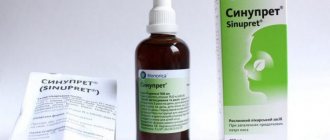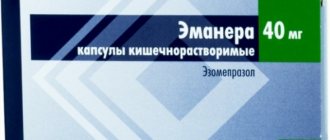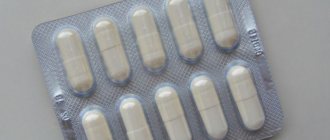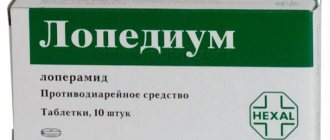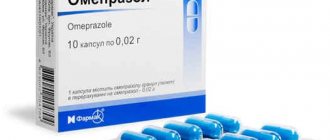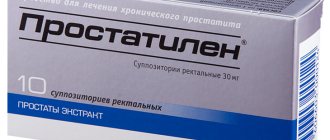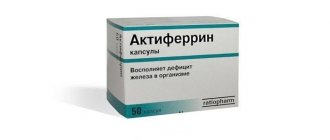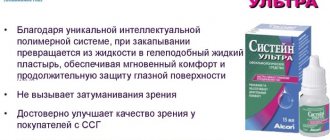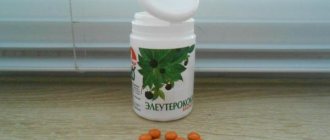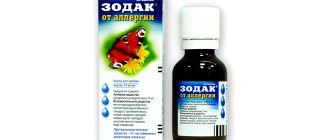Compound
Sinupret contains mainly natural ingredients. Its composition, depending on the dosage form, includes extracts of primrose, gentian, sorrel, elderberry and verbena.
Gelatin, sorbitol, starch, stearic acid and some other substances are used as auxiliary components contained in the tablets.
The drop form of the drug contains 20 percent ethyl alcohol, and the syrup contains 8 percent ethanol, sucrose, cherry flavor and maltitol.
Release form, composition and packaging
Dragees covered with a green shell, round, biconvex.
| 1 dragee | |
| Gentian root powder (Gentiana lutea) | 6 mg |
| Primrose flower powder (Primula veris) | 18 mg |
| sorrel herb powder (Rumex acetosa) | 18 mg |
| Elder flower powder (Sambucus nigra) | 18 mg |
| verbena herb powder (Verbena officinalis) | 18 mg |
Excipients: potato starch, colloidal silicon dioxide, purified water, lactose monohydrate, gelatin, sorbitol, stearic acid.
Shell composition: calcium carbonate, glucose syrup, green varnish E104, E132, yellow-green varnish E104, E132, magnesium oxide, corn starch, dextrin, mountain glycol wax, anhydrous sodium carbonate, methyl methacrylate, dimethylaminoethyl methacrylate and butyl methacrylate copolymer, povidone K25, castor oil, sucrose, shellac, talc, titanium dioxide.
25 pcs. — contour cell packaging (2) — cardboard packs.
Drops for oral administration are yellow-brown, transparent, with an aromatic odor; slight turbidity or slight precipitation may occur.
| 100 g | |
| hydroalcoholic extract* | 29 g |
| * to prepare 100 g of aqueous-alcoholic extract, use: | |
| gentian root (Gentiana lutea) | 200 mg |
| primrose flowers (Primula veris) | 600 mg |
| sorrel grass (Rumex acetosa) | 600 mg |
| elderberry flowers (Sambucus nigra) | 600 mg |
| verbena herb (Verbena officinalis) | 600 mg |
Excipients: ethanol 16.0-19.0 vol.%, purified water.
100 ml - dark glass bottles with a dosing drip device (1) - cardboard packs.
Indications and contraindications
The main diseases for which Sinupret is used are the following pathologies:
- Rhinitis is an inflammation of the nasal mucosa of a viral or other infectious etiology.
- Allergic reactions.
- Frontites.
- Sinusitis.
- Acute or chronic tracheobronchitis.
Like most drugs, Sinupret is contraindicated for use in a number of cases:
- Less than two years old.
- Individual intolerance to one or a number of components of the drug.
- Pregnancy - in the case of using a drop form of the drug or syrup, as they contain alcohol, which negatively affects the health of the unborn baby.
- Lactation period (there are no reliable studies, but it is recommended to refrain from taking the drug if the child has not reached the age of two).
- Alcoholism.
- Peptic ulcer.
You should also take Sinupret with caution in the following pathological conditions:
- epilepsy;
- traumatic brain injuries;
- functional and organic disorders in the liver.
Restrictions
Sinupret in any form is not prescribed to patients under 2 years of age. It should also not be used if you are hypersensitive to the composition or prone to allergic reactions. Other contraindications:
- epilepsy;
- brain diseases;
- liver damage;
- lactation;
- lactase deficiency;
- impaired glucose absorption.
The use of any form of medication is contraindicated for pregnant and naturally breastfeeding women.
Side effects of Sinupret
Most often, the drug is well tolerated by patients and does not cause unwanted reactions. Some patients may experience gastrointestinal disorders, accompanied by gastric and intestinal dyspepsia, as well as abdominal pain. Allergic reactions may also occur in the form of urticaria or Quincke's edema, which quickly disappear immediately after discontinuation of the drug. Dizziness and shortness of breath may occur if the drug is overdosed or taken for too long.
Despite the fact that Sinupret rarely causes unwanted side effects, consultation and clear prescriptions from your doctor are necessary before using it.
Analogs
Instead of Sinupret, the following medications can be used:
- Aflubin-nase is a homeopathic remedy that is available in the form of a nasal spray. It can be used for rhinitis of various origins, sinusitis, pharyngitis, eustachitis in patients over 12 years of age, including pregnant women and breastfeeding women.
- Cinnabsin is a homeopathic drug that is a substitute for Sinupret in its pharmacological group. It is available in tablets, which are recommended for sinusitis in patients over 3 years of age. Cinnabsin can be used with caution during pregnancy and breastfeeding.
- Rinitol Edas-131 is a homeopathic drug that belongs to the Sinupret substitutes in the pharmacological group. It is produced in nasal drops, which are contraindicated for persons under 18 years of age, since there is not enough experience in treating minor patients. They can be used during pregnancy and lactation.
- Corysalia is a homeopathic remedy available in lozenges. It is a substitute for Sinupret in the therapeutic group. The drug can be used for runny nose in children over 1.5 years old, pregnant women and breastfeeding women.
Dosage forms
Sinupret is produced and sold in various forms:
- Tablet form. This is the most commonly prescribed type of drug. It can be used to treat adults and children over ten years of age. The tablets must be swallowed and washed down with water in the required volume, always in their entirety, without chewing.
For the treatment of particularly severe diseases, such as sinusitis and sinusitis, therapists prescribe Sinupret Forte, which contains a higher concentration of medicinal substances.
- The drip form is an alcohol setting used for oral administration. This type of drug is characterized by greater effectiveness compared to tablets. The drops are absorbed into the blood faster and begin to act. This form can only be prescribed to adults and children over 10 years of age due to the increased concentration of ethyl alcohol in the composition.
Attention! It is prohibited to instill drops into the nose, since the medicine does not have a local therapeutic effect; on the contrary, the alcohol in its composition can cause damage to the mucous membrane and inflammation.
- Syrup. Contains a lower concentration of alcohol and is allowed for pregnant women and small children.
Indications for use
for adults
- Diseases of the paranasal sinuses, acute and chronic.
- As part of complex therapy for diseases that are accompanied by difficult to separate sputum.
The advantage of Sinupret is that it helps to cure respiratory diseases, and does not just mask the symptoms. The tablets do not have a vasoconstrictor effect, but can make breathing easier by reducing swelling and resolving accumulated exudate.
for children
- Respiratory tract diseases: acute and chronic bronchitis, tracheobronchitis, pneumonia, bronchial asthma, influenza, tracheitis, pharyngitis.
- Diseases of the paranasal sinuses: sinusitis, sinusitis.
for pregnant women and during lactation
According to general indications for use after consultation with a doctor.
Can Sinupret be used during pregnancy?
The drug has not been proven to have an aggressive and negative effect on the body of a pregnant woman and the unborn baby, therefore its use is not prohibited subject to a number of rules:
- Absence of severe chronic diseases.
- Use of Sinupret in tablet form. Syrup and drops cannot be used due to the presence of alcohol in the composition.
- Absence of allergies and individual hypersensitivity to the components of the drug.
Description, forms of implementation, properties
The drug produced helps in the treatment of acute and chronic inflammatory pathologies of the respiratory tract. It is made on the basis of herbal extracts and is sold through Russian pharmacy chains in three forms:
- drops (yellowish, transparent);
- dragees (biconvex, green);
- syrup (produced for children, has a cherry flavor);
- pills.
The main components of the composition and their properties in medical practice:
- Verbena
. It has antispasmodic and anti-inflammatory effects, has a positive effect on the general condition of the body, and improves well-being. - Gentian extract
. Enhances secretion production, regulates appetite. - Primrose
. Acts as a sedative and mucolytic agent. Relieves spasms, speeds up the process of mucus removal. - Black elderberry
. Relieves inflammatory processes, eliminates bacterial infection. - Sorrel
. Kills pathogenic bacteria, relieves inflammation, eliminates swelling.
The medication is used in the treatment of viral and bacterial infections and helps improve the effectiveness of antibiotics when taken simultaneously.
Sinupret is available in different forms, each of which corresponds to its own indications.
No pharmacokinetic data available. The average cost of a medicine ranges from 200 to 400 rubles per package. Can be purchased without presenting a prescription.
Dosage and timing of administration
Doctors prescribe the drug for a period of one to two weeks. If after this period of time there is no relief from the symptoms of the disease, then consultation with an otolaryngologist is necessary, who will adjust the treatment, dosage and frequency of Sinupret administration.
The drug in tablet form is prescribed to adult patients, 2 tablets three times a day. Children over 6 years old are recommended to take 1 tablet with the same frequency.
The drop form of the drug can be used for the treatment of adults and children over 10 years of age. The drug is prescribed three times a day, 50 and 25 drops, respectively.
Sinupret in the form of syrup is recommended for children aged 2 to 5 years to take in a volume of 2 ml three times a day. In this case, it is advisable to dilute it with a small volume of boiled water. Children aged 6 to 12 years also take the medicine 3 times a day, but 3.5 milliliters per dose, and teenagers should take 7 milliliters of syrup.
special instructions
Drops for oral administration contain 16.0-19.0% ethanol (v/v).
When using drops for oral administration, the bottle should be kept in an upright position.
When storing drops for oral administration, slight turbidity and slight precipitation may occur, but this does not affect the activity of the drug.
The bottle should be shaken before use.
When using the drug in pill form in patients with diabetes, it should be kept in mind that the digestible carbohydrates contained in 1 pill are less than 0.03 XE.
Impact on the ability to drive vehicles and operate machinery
The drug does not affect the ability to drive vehicles or operate machines.
Why is Sinupret more effective at the beginning of treatment?
In 2012, a study was conducted that included 95 children with acute rhinosinusitis less than 2 days old.
Absolutely all children had not previously received treatment with any mucolytic, antihistamine or antibiotic drugs. All subjects were prescribed vasoconstrictor drops, nasal rinsing with saline solution, and antiviral agents. In addition, 75 children were prescribed Sinupret in recommended dosages (from 2 to 6 years - in the form of drops, from 6 to 14 years - in the form of pills). According to the results of the study, in children receiving the drug Sinupret, a more significant therapeutic effect developed within 6 days after the start of the study. We advise you to study: Rhinorus is a vasoconstrictor drug that treats without drying out the mucous membrane
Modern research proves that bacterial rhinosinusitis develops against the background of a viral infection due to swelling of the mucous membrane and a decrease in the outflow of secretions from the paranasal sinuses. The use of Sinupret improves mucociliary clearance and helps prevent the development of bacterial sinusitis and avoid the use of antibiotics.
Operating principle
Sinupret is a herbal medicine. The therapeutic effect of plants in the composition of the product is manifested in a complex. The instructions describe the following properties of the medicine:
- secretion is regulated, mucus viscosity decreases;
- Sinupret counteracts tissue inflammation and reduces it;
- an immunomodulatory effect occurs;
- antiviral protection is provided: Sinupret inhibits the reproduction of various respiratory viruses, for example, influenza virus in form A, parainfluenza virus, etc.
As a result of the use of Sinupret, drainage and ventilation of the nasal sinuses are restored, nasal congestion decreases or disappears, and the protective function of the respiratory tract epithelium returns to normal. Thanks to the immunomodulatory and protective effect of Sinupret, the effectiveness of antibiotic therapy increases.
Reviews
Reviews of Sinupret can be called enthusiastic. Parents note that the drug is indispensable in the treatment of prolonged runny nose, sinusitis, and sinusitis. As a positive point, many users indicate the herbal composition and safety. And as a disadvantage they describe the high cost and the need for long-term use.
Masha writes that when using conventional remedies for the common cold, she was always afraid of damaging the nasal mucosa. But with Sinupret, she is not afraid of harming herself or the child. Masha considers Sinupret the safest and most reliable medicine for the treatment of inflammation in the sinuses.
Irina thinks that “side effects” are still possible due to the rich herbal composition, so the dosage should be strictly observed. The family “became acquainted with the drops” when the doctor prescribed Sinupret for her daughter’s rhinitis. A simply wonderful result for the woman was that by the second day of treatment, the baby’s snot started pouring out in streams, and by the third or fourth day the runny nose disappeared. The same effect was observed with subsequent sinusitis. In this case, the drug also helped remove unnecessary accumulations that interfere with breathing, relieved pain in the sinuses and restored the sense of smell. However, we additionally had to conduct a course of local antibacterial therapy using a spray—Polydex for children.—
Sveta believes that although the medicine tastes very nasty and it is difficult to persuade a child to take it, the result is worth it. She used Sinupret for adenoids in both of her children, trusting the positive reviews of the pediatrician. The children’s adenoids worsened in the fall, simultaneously with visits to a child care facility. Enlarged tonsils caused constant colds and tonsillitis, and nasal congestion. But after complex therapy, including Sinupret, nasal breathing returned to normal, and purulent discharge decreased. After completing the course, the doctor reported that the tonsils even decreased in size.
Anastasia gives a “plus” for herbal ingredients and a “minus” for the side effect in the form of an allergic cough. The doctor prescribed Sinupred to her 4-year-old daughter for a runny nose complicated by adenoids. However, after several doses, the girl developed a severe cough and had to stop taking it. Nastya attributes this reaction to individual intolerance.
Valentina was surprised by the unconventional approach of the manufacturer of Sinupret to the treatment of a runny nose: after all, they usually drop or splash something into the nose, rather than take the tincture orally. But already on the second day the effect became noticeable: severe congestion disappeared, the mucus became thinner and came out of the nose more easily. Valentina is confident that the use of Sinupret along with other treatment measures significantly accelerated her child’s recovery.
Overdose
In medical practice, there have been no clinical cases of overdose of Sinupret oral drops. Laboratory tests of the drug have shown that if the permissible dosage recommended by the manufacturer of the drug is exceeded, the following symptoms may appear:
- irritation of the oral mucosa, which is expressed in its redness and itching;
- development of rapid swelling of the larynx, which will lead to the onset of an extensive allergic reaction and cause an attack of suffocation;
- redness of the skin, the appearance of a red rash, localized on the surface of the abdomen, neck, upper limbs;
- heart rhythm disturbance, which is characterized by rapid heartbeat and sudden subsidence;
- attacks of spasmodic pain in the area of the stomach and intestines;
- urge to urinate more frequently;
- diarrhea, which may not stop for 1-3 days;
- shortness of breath and feeling of lack of air.
After signs of an overdose of Sinupret drops appear, you should call an ambulance as soon as possible. Before the doctors arrive, you must take the sorbent drug.
This can be 6-8 tablets of Activated Carbon, 1 sachet of Atoxil or Smecta, 1 tbsp. l. Enterosgel. After the emergency doctor arrives, the severity of the patient is determined and a decision is made on hospitalization.
Video about runny nose
Pediatrician Evgeniy Komarovsky dedicated an entire episode of his television school to children’s runny nose and medications for it. Watch the video to understand this issue together with the studio guests.
Sinupret is a homeopathic medicine. And although, according to evidence-based medicine, the effectiveness of such remedies does not exceed the effect of ordinary self-hypnosis, many users on the Internet are ready to argue with the statements of doctors. Supporters of Sinupret justify their opinion by the fact that the drops are not a homeopathic, but a herbal medicine, and its effect is due to the activity of plant components. What do you think? Write your opinion in the comments.
How long should you store Sinupret drops after opening?
Instructions for use:
Prices in online pharmacies:
Sinupret is a herbal preparation that has secretolytic, secretomotor, anti-inflammatory and antiviral effects.
Release form and composition
- coated dragees: round, convex on both sides, green (25 pieces in a blister, 2 or 4 blisters in a cardboard box);
- drops for oral administration: transparent yellowish-brown liquid with a characteristic aroma (100 ml in dark glass bottles equipped with a dosing drip device, 1 bottle in a cardboard box).
Active ingredients in 1 tablet:
- sorrel herb (Rumex acetosa) – 18 mg;
- travaverbena (Verbena officinalis) – 18 mg;
- primrose flowers (Primula veris) – 18 mg;
- elderberry flowers (Sambucus nigra) – 18 mg;
- gentian roots (Gentiana lutea) – 6 mg.
Additional components of the dragee:
- excipients: purified water, gelatin, colloidal silicon dioxide, lactose monohydrate, stearic acid, sorbitol, potato starch;
- shell: copolymer of butyl methacrylate, methyl methacrylate and dimethylaminoethyl methacrylate, corn starch, dextrose (glucose) syrup, anhydrous sodium carbonate, magnesium oxide, calcium carbonate, mountain glycol wax, povidone K25, dextrin, talc, sucrose, titanium dioxide, castor oil, yellow varnish green E104, E132 and green varnish E104, E132.
100 g of drops contain 29 g of aqueous-alcoholic* extract from a mixture of the following types of plant materials:
- sorrel grass (Rumex acetosa) – 0.6 mg;
- travaverbena (Verbena officinalis) – 0.6 mg;
- primrose flowers (Primula veris) – 0.6 mg;
- elderberry flowers (Sambucus nigra) – 0.6 mg;
- gentian roots (Gentiana lutea) – 0.2 mg.
* ethanol is 16.0-19.0% (v/v).
Excipient of drops: purified water.
Indications for use
Sinupret is used to treat acute and chronic sinusitis, accompanied by the formation of a viscous secretion.
Contraindications
- sucrase/isomaltase deficiency, galactose, lactose or fructose intolerance, glucose-galactose malabsorption, lactase deficiency (for tablets);
- alcoholism and the period after successful anti-alcohol treatment (for drops);
- children under 2 years old - for drops, up to 6 years old - for tablets;
- lactation period;
- hypersensitivity to the components of Sinupret.
In the form of drops, the drug should be prescribed with caution for epilepsy, liver diseases, injuries and diseases of the brain.
Directions for use and dosage
Sinupret should be taken orally: tablets - swallowed whole and washed down with water, drops - pre-diluted in a small amount of water.
No, I don’t comply, nothing bad will happen. I try to comply and look at the appearance of the products.
- adults – 50 drops or 2 tablets 3 times a day;
- school-age children – 25 drops or 1 tablet 3 times a day;
- children 2–6 years old – 15 drops 3 times a day.
The duration of treatment is from 7 to 14 days.
On the recommendation of a doctor, repeated courses of therapy are possible.
In the form of drops, Sinupret must be shaken before use.
Side effects
- gastrointestinal disorders: nausea, epigastric pain;
- allergic reactions: redness of the skin, skin rashes, itching, shortness of breath, angioedema.
special instructions
Information for patients with diabetes: digestible carbohydrates contained in 1 tablet are less than 0.03 bread units.
Sinupret drops contain 16–19% ethanol (v/v).
The bottle should be stored in an upright position.
During storage of the drops, a slight sediment may form and the liquid may become slightly cloudy. These reactions do not affect the effectiveness of the drug.
When used in recommended doses, Sinupret does not affect the mental activity of patients, therefore it can be used by persons regardless of their field of employment, including vehicle drivers.
During pregnancy, the drug is prescribed only by a doctor. Due to the ethanol content, Sinupret in the form of drops is recommended for use only if it is impossible to take pills.
Drug interactions
The use of Sinupret in combination with antibiotics is considered appropriate (if necessary).
Interaction with other drugs is not known.
Terms and conditions of storage
Store in a dry place, protected from light and out of reach of children, at temperatures up to 25 ºС.
Shelf life – 3 years. After opening the bottle for the first time, Sinupret drops are suitable for use for 6 months.
Found an error in the text? Select it and press Ctrl + Enter.
Additional components of the dragee:
Release form, composition and packaging
dragees: 20 or 50 pcs.
Reg. No.: 8895/09/14 from 28.05.
2014 - Active
| Dragee | 1 dragee |
| gentian root powder | 12 mg |
| primrose flower powder | 36 mg |
| sorrel grass powder | 36 mg |
| elderflower powder | 36 mg |
| verbena herb powder | 36 mg |
Excipients:
potato starch, silicon dioxide, purified water, lactose monohydrate, gelatin, sorbitol, stearic acid, calcium carbonate, dextrose syrup, magnesium oxide, corn starch, modified corn starch, glycolic mountain wax, anhydrous sodium carbonate, eudragit, povidone K25, castor oil , sucrose, shellac, talc, titanium dioxide, dyes (E104, E132, E170, E171).
20 pcs. - blisters (1) - packaging. 25 pcs. — blisters (2) — packaging.
syrup: drop bottle 100 ml
Reg. No.: 8995/09/14 from 10.10.
2014 - Active
| Syrup | 100 g |
| hydroalcoholic extract* | 10 g |
| from a mixture of medicinal plant materials: | |
| gentian root | 70 mg |
| primrose flowers | 207 mg |
| sorrel herb | 207 mg |
| elderberry flowers | 207 mg |
| verbena herbs | 207 mg |
Excipients:
ethanol (8 vol.%), liquid maltitol, cherry flavor, distilled water.
* Extractant: ethanol (59 vol.%)
100 ml - dropper bottle (1) - cardboard packs.
tab., cover shell: 50 pcs.
Reg. No.: 2374/97/02/07/12/17 dated 12/29/2017 - Registration period. beat is not limited
Green film-coated tablets, round, biconvex, with a smooth surface.
| 1 tab. | |
| crushed medicinal plant raw materials (powder) from: | |
| gentian root (Gentianae radix) | 6 mg |
| primrose flowers (Primulae flos) | 18 mg |
| sorrel herb (Rumicis herba) | 18 mg |
| elderberry flowers (Sambuci flos) | 18 mg |
| verbena herb (Verbenae herba) | 18 mg |
Excipients:
gelatin, lactose monohydrate, potato starch, anhydrous colloidal silicon dioxide, sorbitol, stearic acid, purified water.
Source: https://mir-espresso.ru/sredstva/sinupret-kapli-skolko-hranit-posle-vskrytiya
